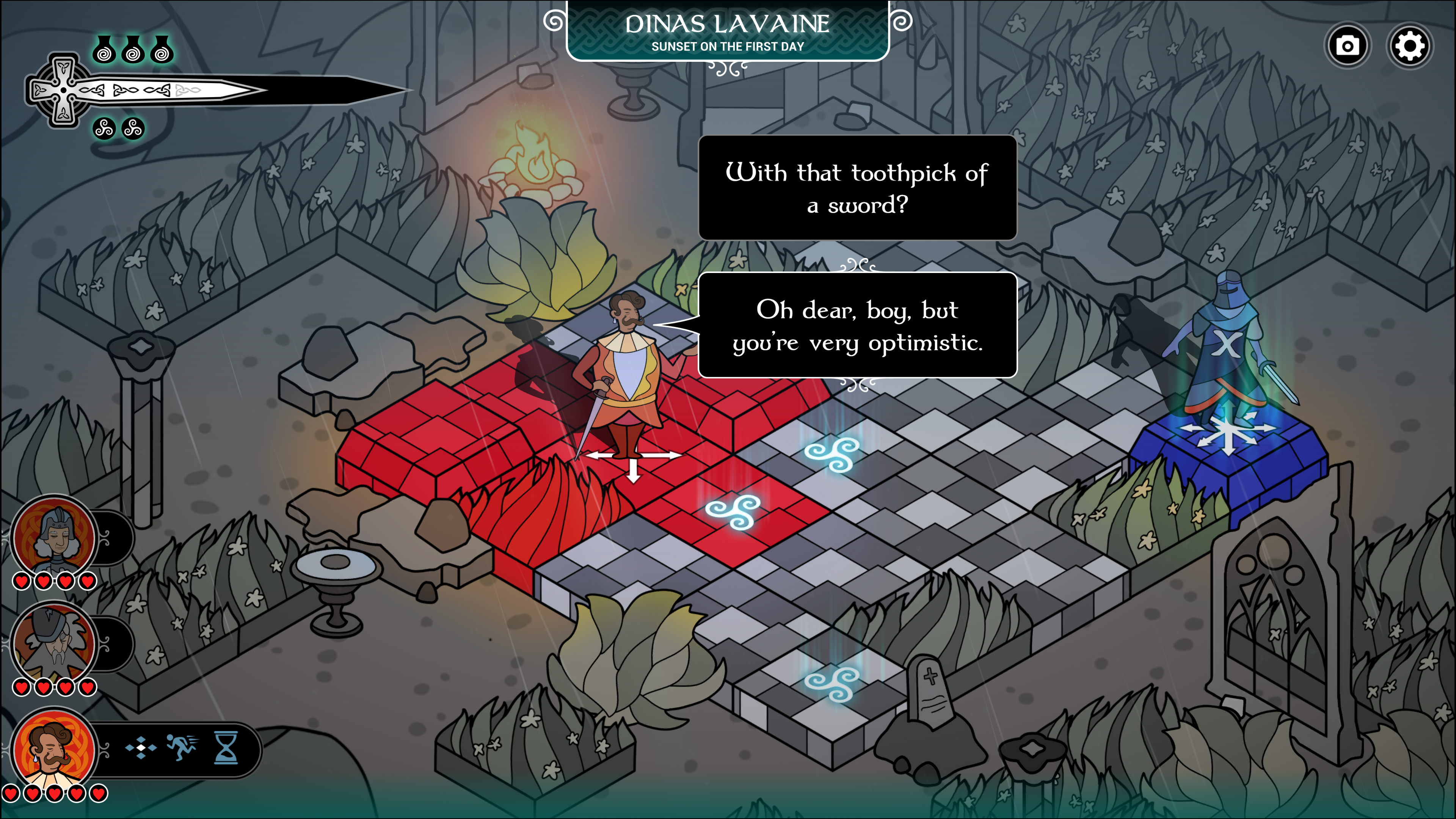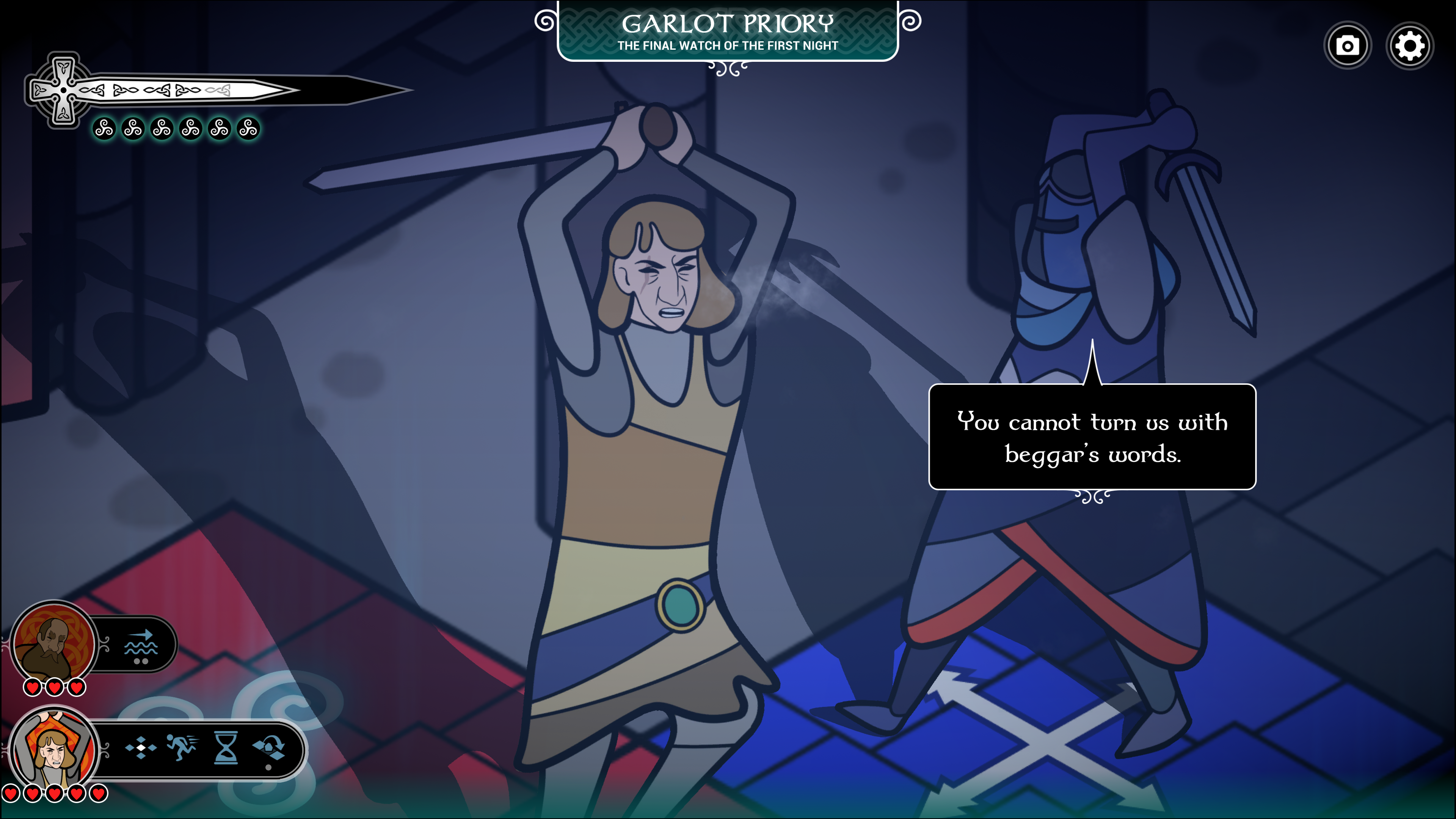Our Verdict
An accessible strategy game tied to a powerful, dynamic story generator.
PC Gamer's got your back
What is it? A strategy game based on the legend of King Arthur.
Developer Inkle
Publisher In-house
Reviewed on RTX 2080 Super, Intel i7-9700K, 16GB RAM
Multiplayer None
Link Official site
I've lost count of how many endings I've seen in Pendragon, the latest game from 80 Days creator Inkle. Your primary goal is always the same: gather a party of warriors and reach the battlefield of Camlann to help King Arthur defeat his nemesis, the evil Mordred. But what happens on the dangerous, winding road leading to this fateful encounter is different every time. The characters you meet, the places you explore, and the enemies you run into are heavily randomised, which makes for an excitingly dynamic and unpredictable storytelling experience—albeit one that occasionally punishes you with a sudden and unsatisfying finale.
Pendragon is a narrative roguelike based on Arthurian legend. Some knowledge of the mythology will help you navigate the story, as I had very little and felt like the game could have done a better job of leading me into its world. The story begins after the breaking of the fabled Round Table. Camelot has fallen and Arthur's allies have scattered, leaving him to face Mordred at Camlann alone. And that's where you come in. You pick one of several playable characters—Guinevere and Lancelot are available to begin with, but more can be unlocked—and embark on a quest across Britain to aid him.

But here's the thing: you're gonna fail, a lot. You'll repeatedly die on the road to Camlann, sometimes only a short while into your journey. Then when you finally do battle your way there, one of Mordred's powerful knights might just coldly strike you down. But defeat in Pendragon never feels like a game over; it's more like the last page of a particularly grim storybook. You close it, pick another from the shelf, blow the dust off the cover, and hope Arthur's pals are more successful in this one. Failure can be frustrating in Pendragon, but the path taken to that failure is almost always interesting.
Defeat in Pendragon never feels like a game over
This marks something of a departure from Inkle's previous work in that it's a turn-based strategy game. The game is made up of a series of gridded boards, presented as ruined castles, shadowy forests, and ancient standing stones, reaching the end of which moves you ever closer to your final destination. Sometimes you'll be able to travel across a board unchallenged, encountering a recruitable ally, a talkative villager, or a moment of evocative world-building. But often there are enemies in your way, be they territorial wolves or loyal soldiers of Mordred. As you move you 'paint' the board, taking ownership of any squares you touch, which lets you move faster on them.
What I like about Pendragon is how there's no real separation between the strategy and the story. The plot unfolds naturally on the board as you move and fight. A heroic sacrifice or a sudden death can have a profound impact on another character, unlocking one of the game's many special moves, such as charging across water tiles, jumping over blocked squares, or killing multiple enemies in a line. But I'd be lying if I said every story was compelling. My party being ambushed and unceremoniously killed by giant snakes in a boggy marsh is not exactly the stuff of legends and campfire stories. Pendragon can be punishing, even on the lowest difficulty setting.

Occasionally you'll bump into people who become playable characters, whether it's the cruel witch Morgana le Fay or the boorish Sir Kay. Your choice of character colours the narrative, each having a distinctive personality and way of speaking. Some also have unique powers, such as Morgana's ability to briefly tame wild animals. The starting board for each hero is always the same, establishing their place in the world and motivation for journeying to Camlann. But after that, the randomiser takes over and you're never quite sure what twists and turns the story will take on the long road ahead.
Every story, even if it isn't a particularly good one, is wildly different
Compared to the lavishly descriptive 80 Days, Pendragon is sparsely written, with short bursts of economical dialogue. Which, honestly, I found a little disappointing at first. But over time I came to accept that its greatest storytelling tool isn't its prose, but its systems and how they interact. This is by far Inkle's most replayable game. Every story, even if it isn't a particularly good one, is wildly different. As a strategy game it's pretty pared down, but the way it seamlessly combines narrative and play is expertly done. The legend of King Arthur has been told and retold countless times before, but never quite like this.
An accessible strategy game tied to a powerful, dynamic story generator.
If it’s set in space, Andy will probably write about it. He loves sci-fi, adventure games, taking screenshots, Twin Peaks, weird sims, Alien: Isolation, and anything with a good story.



